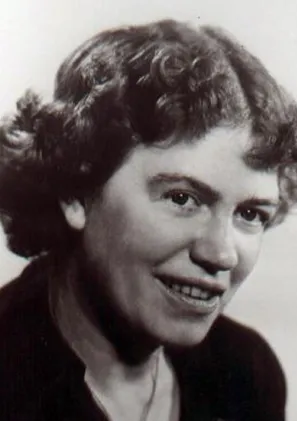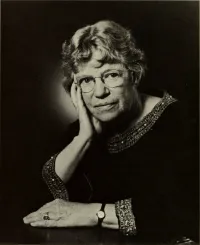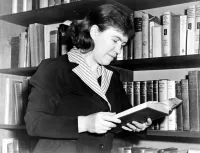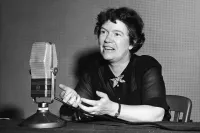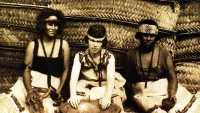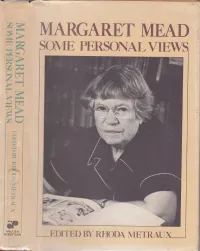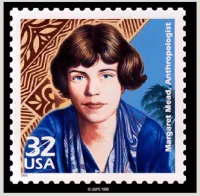Biography
1901 - 1978
"Never doubt that a small group of thoughtful committed citizens can change the world; indeed, it's the only thing that ever has."
- Margaret Mead
Margaret Mead became world famous for her studies of South Sea peoples, especially Coming of Age in Samoa (1928), which rejected biological determinism to emphasize the inexorable influence of cultural forces on adolescent development. She later expanded her study, which led her to admonish American parents for what she saw as comparatively inept child-rearing practices in the United States. She wrote more than 1,000 articles and 30 books in addition to working as a curator at the American Museum of Natural History in New York City. Though she was married three times, in the mid-1920s Mead began a life-long relationship with fellow anthropologist Ruth Benedict which influenced how the two women interpreted what was deemed “normal” in a culture. As a result, Mead came to describe the “deviant” as a person who “demanded a different or improved environment but who rejected the traditional choices” to set up alternate standards. She became one of the earliest proponents of bisexuality, questioning the socio-cultural forces that demand people choose between a lifetime of exclusive homosexuality or heterosexuality.
1901 - 1978
"Never doubt that a small group of thoughtful committed citizens can change the world; indeed, it's the only thing that ever has."
- Margaret Mead
Margaret Mead became world famous for her studies of South Sea peoples, especially Coming of Age in Samoa (1928), which rejected biological determinism to emphasize the inexorable influence of cultural forces on adolescent development. She later expanded her study, which led her to admonish American parents for what she saw as comparatively inept child-rearing practices in the United States. She wrote more than 1,000 articles and 30 books in addition to working as a curator at the American Museum of Natural History in New York City. Though she was married three times, in the mid-1920s Mead began a life-long relationship with fellow anthropologist Ruth Benedict which influenced how the two women interpreted what was deemed “normal” in a culture. As a result, Mead came to describe the “deviant” as a person who “demanded a different or improved environment but who rejected the traditional choices” to set up alternate standards. She became one of the earliest proponents of bisexuality, questioning the socio-cultural forces that demand people choose between a lifetime of exclusive homosexuality or heterosexuality.
Lesson Plan
Please login or register for an account to view this lesson plan.
Demography
Demography
Gender Female
Sexual Orientation Bisexual
Gender Identity Cisgender
Ethnicity Caucasian/White
Faith Construct Protestant
Nations Affiliated United States
Era/Epoch First-wave Feminism (1848-1930) Information Age (1970-present) World War II (1939-1945)
Field(s) of Contribution
Academics
Author
Education
Humanities & Religion
Lecturer
Media & Communications
Science
Social Justice
Social Sciences
STEM & Medicine
US History
Commemorations & Honors
UNESCO Kalinga Prize for the Popularization of Science Award (1970)
National Women's Hall of Fame Inductee (1976)
Posthumous Presidential Medal of Freedom Award For Science (1979)
U.S. Postal Service Issued Celebrate the Century Commemorative Stamp in Her Honor (1998)
Demography
Gender Female
Sexual Orientation Bisexual
Gender Identity Cisgender
Ethnicity Caucasian/White
Faith Construct Protestant
Nations Affiliated United States
Era/Epoch First-wave Feminism (1848-1930) Information Age (1970-present) World War II (1939-1945)
Field(s) of Contribution
Academics
Author
Education
Humanities & Religion
Lecturer
Media & Communications
Science
Social Justice
Social Sciences
STEM & Medicine
US History
Commemorations & Honors
UNESCO Kalinga Prize for the Popularization of Science Award (1970)
National Women's Hall of Fame Inductee (1976)
Posthumous Presidential Medal of Freedom Award For Science (1979)
U.S. Postal Service Issued Celebrate the Century Commemorative Stamp in Her Honor (1998)
Resources
Resources
Banner, Lois W. Intertwined Lives: Margaret Mead, Ruth Benedict, and Their Circle. Knopf, New York: 2004.
Bateson, Mary Catherine. With a Daughter's Eye: A Memoir of Margaret Mead and Gregory Bateson. New York: William Morrow, 1984.
Chassler, Sey, Mead, Margaret and Metraux, Rhoda. Aspects of the Present. New York: William Morrow, 1980.
Lapsley, Hilary. Margaret Mead and Ruth Benedict: The Kinship of Women. Amherst, Mass.: University of Massachusetts Press, 1999.
Mead, Margaret. Coming of Age in Samoa: A Psychological Study of Primitive Youth for Western Civilisation. New York: Harper Perennial Modern Classics, 2001.
Murray, Stephen O. "Mead, Margaret." Who's Who in Gay & Lesbian History from Antiquity to World War II. Robert Aldrich and Garry Wotherspoon, eds. New York: Routledge, 2001. 304.
http://www.brainpickings.org/2013/10/23/margaret-mead-ruth-benedict-love-letters/
https://www.nndb.com/people/017/000029927/
https://www.encyclopedia.com/people/social-sciences-and-law/anthropology-biographies/margaret-mead
http://en.wikipedia.org/wiki/Margaret_Mead
https://en.wikipedia.org/wiki/Ruth_Benedict (mentions Mead)
Resources
Banner, Lois W. Intertwined Lives: Margaret Mead, Ruth Benedict, and Their Circle. Knopf, New York: 2004.
Bateson, Mary Catherine. With a Daughter's Eye: A Memoir of Margaret Mead and Gregory Bateson. New York: William Morrow, 1984.
Chassler, Sey, Mead, Margaret and Metraux, Rhoda. Aspects of the Present. New York: William Morrow, 1980.
Lapsley, Hilary. Margaret Mead and Ruth Benedict: The Kinship of Women. Amherst, Mass.: University of Massachusetts Press, 1999.
Mead, Margaret. Coming of Age in Samoa: A Psychological Study of Primitive Youth for Western Civilisation. New York: Harper Perennial Modern Classics, 2001.
Murray, Stephen O. "Mead, Margaret." Who's Who in Gay & Lesbian History from Antiquity to World War II. Robert Aldrich and Garry Wotherspoon, eds. New York: Routledge, 2001. 304.
http://www.brainpickings.org/2013/10/23/margaret-mead-ruth-benedict-love-letters/
https://www.nndb.com/people/017/000029927/
https://www.encyclopedia.com/people/social-sciences-and-law/anthropology-biographies/margaret-mead
http://en.wikipedia.org/wiki/Margaret_Mead
https://en.wikipedia.org/wiki/Ruth_Benedict (mentions Mead)
